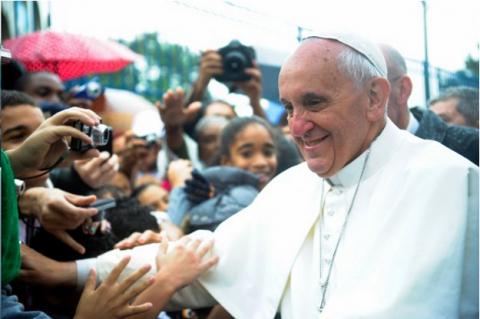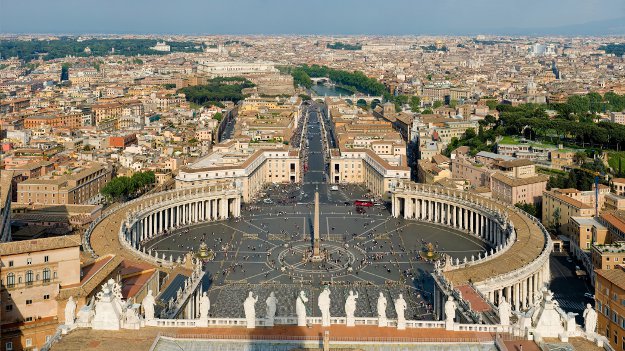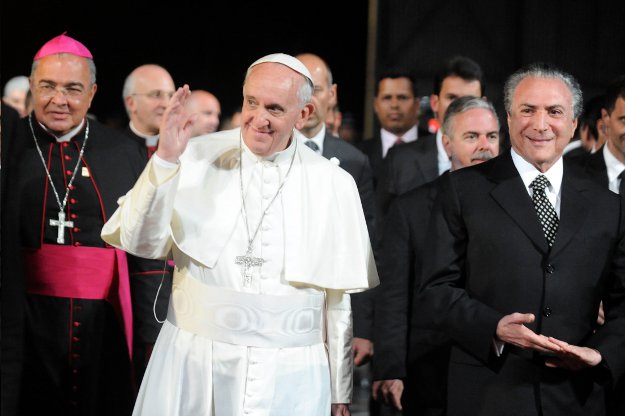How Pope Francis Forged an Unusual Path in the Church

There seemed to be two main reactions when news broke that Pope Francis invited the dubbed Godmother of Punk, Patti Smith, to perform at the Vatican's Christmas Party. The first was a collective, "Who?" from those unfamiliar with the poet-singer. Those who are familiar with her seemed to be a bit puzzled as well but for different reasons. The first line many people heard Patti Smith sing came from her first LP, Horses, released in 1975. The opening track is a cover of Van Morrison's hit "Gloria." An eerie and gentle piano begins to play as Patti Smith calmly but defiantly utters "Jesus died for somebody's sins, but not mine". Powerful words from a powerful mind, but a mind that has also repeatedly mentioned religion having an impact on her growing up and has never denounced it. This is a point Patti Smith has reinforced recently in interviews such as the one conducted by Vivien Goldman for The Guardian as negative reactions were hurled from music fans and religious groups alike. It should also be pointed out that the two have previously met and were photographed shaking hands in St Peter's Square, but this event sparked far less debate.
Pope Francis' invitation to Patti Smith is one of many out of the ordinary actions of his papacy. He now infamously has said he disagrees with denouncing people of the LGBT community. His statements last year went as far as saying the Church is unhealthily "obsessed" with issues such as abortion, contraception, and gay marriage and that he found it wrong to put dogma before love. This among other actions, such as taking a more direct approach in handling the child abuse occurrences storming around the Church and even starting a committee to fight such abuses, adhere to the philosophy of making the Church "a home for all" that Pope Francis seems to be promoting in speech and in action. Even members of the Millennial Generation, the least religious generation to date, seem to be impressed with this attitude. From speaking about conserving the rainforest when visiting natives in Brazil, to calling out the global financial system for being detrimental to the poor, there are a plethora of issues of mutual interest between the religious leader and the emerging dominant generation. Arguably more so with this Pope than ever before.
Yet one can’t forget other stances the Pope has taken on hot-button issues. Such examples were described in Josephine McKenna's November article for the Huffington Post. Pope Francis has denounced issues such as in vitro fertilization and euthanasia, also known as the "right to die". He insisted both actions go against the will of God. When speaking of in vitro fertilization, he said taking part in such practices promoted children as "a right as opposed to a gift to welcome". He continued to say stem cell research "used human beings as guinea pigs to presumably save others." As the so-called "right to die" movement became more commonly discussed, Pope Francis decided to address the issue by saying it went against the will of the Creator and was a symptom of today's "throw-away culture," in reference to what he feels is the view of many on the sick and the elderly. As millennials lead the way to a future based more on science and technology, it appears here lies a clash between the two ideologies.

Pope Francis has done more to accept the social realities than any of his predecessors. This is evident in his progress in acceptance of previously alienated groups such as the LGBT community, or shying away from always making the safe choices and inviting someone such as Patti Smith to play at the Vatican. It is fair to perhaps recognize a correlation between the emerging dominant generation's (the millennial generation) values with the evolving ideas and actions by religious leaders such as Pope Francis. That after all, is just good politics and business. Basic marketing is finding your target audience and doing your best to sell your product or services to this audience. Therefore, the future of organized religion as we know it relies heavily on participation from the millennials, who are more skeptical than most. That is why so many have taken advantage of, and even more accept, technological advances such as stem cell research and in vitro fertilization. This is why it is hard to imagine any religion being able to sway the majority of millennials to disregard or ignore such technological and scientific achievements.
Pope Francis recently took advantage of his Christmas speech to speak his mind on the Vatican bureaucracy. As seems to be the case with his speeches, the people within the Church hierarchy to whom he was addressing directly may have found his language to be abrasive. The global reaction from the frustrated masses , however, found his words to be refreshingly accurate. As Gaia Pianigiani wrote in the New York Times in a recent article, Pope Francis once again emphasized that the Church was meant to serve the poor and urged to shy away from gossip and scandal and other unnecessary distractions from this goal.
Including himself amongst the sinners who need forgiveness, Pope Francis delivered empathy and humility in a way that is a welcome change to the approach of not only religious leaders, but elected government figures around the world. Indeed, his time so far in this holy position differs greatly than that of Benedict XVI, who held the papacy prior to him. Due to the many people, specifically of the Millennial Generation, embracing Pope Francis and his ideas, one would believe the logical choice for whoever will take over as Pope after him would continue down this path. That path being the one that recognizes the constantly changing world and the crucial issues that manifest along the way. This is a path that welcomes controversial but valid artists such as Patti Smith and people of a similar mindset, and the technology that becomes more and more integrated in modern culture . Pope Francis has been a trailblazer in this regard on most, but not all, issues of the current times. He embraces technology so much that he even has a twitter feed to reach the young masses, just another step in the growth within the Church and the perception of the Church he has fostered in his papacy.

It is almost impossible to see something so deeply embedded in our culture as religion become completely irrelevant, but as Patti Smith sang at the Vatican this past December, 39 years to the day of the release of the prior mentioned Horses album, it is clear we have entered a new era in organized religion.
Author Bio:
Laura Storch is a contributing writer at Highbrow Magazine.































































































































































































































































































































